Iranian Vice President Denies Son's Immigration To Canada
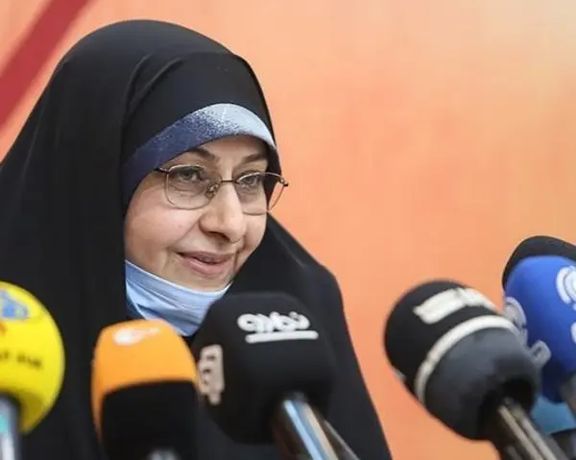
Iran’s Vice President for Women and Family Affairs Ensieh Khazali has denied reports about her son’s immigration to Canada that caused uproar among the Iranian community.

Iran’s Vice President for Women and Family Affairs Ensieh Khazali has denied reports about her son’s immigration to Canada that caused uproar among the Iranian community.
In a series of tweets on Wednesday, Khazali claimed that her son, Hamidreza Rezazadeh, is on a temporary business trip abroad aimed at enhancing the country’s “knowledge-based sector,” in reference to the Supreme Leader’s call for a knowledge-based economy.
Ali Khamenei designated the new Iranian calendar year as the year of knowledge-based productivity and job creation. He has been designating slogans for each year in the past decade, such as “Leap in Production”. Iranian officials and organizations try to portray their activities as if they are in line with the Khamenei-designated motto.
Khazali added that her son never planned immigration, “although he is married and independent,” and criticized those who spread the rumor, noting that “Fortunately, the job project is near completion and he will return to the country in the coming months.”
“Undoubtedly, [efforts] to lay the foundation for knowledge-based activities in the country stem from patriotism,” she said
Calling for her dismissal, university professor and political activist Rahmatollah Bigdeli said, “If I were in Mr. Raisi’s shoes, I would fire Mrs. Khazali not because of her son's stay in Canada, but because of this kind of ridiculous abuse of this year’s designation by the Supreme Leader.”
In early August, an official criticized the high number of “senior officials” whose relatives are living abroad, confirming that there are over 4,000 sons and daughters who have left Iran.
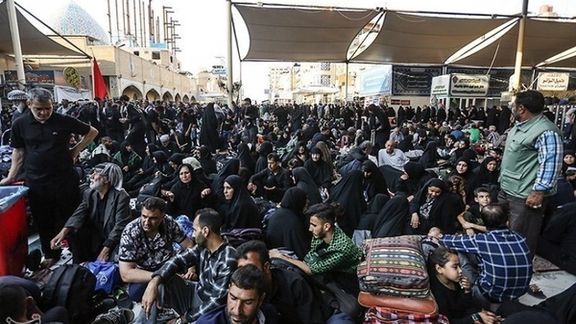
Iraq and Iran have closed land borders as millions of Iranian pilgrims supported by Tehran were on the move to reach Karbala to mark a Shiite religious event.
The Iranian government’s office organizing the Arbaeen pilgrimage said Friday, “Because of worrying incidents at [two border crossings] and serious dangerous incidents occurring for the security and wellbeing of pilgrims” the borders are closed.
Although Iranian authorities say they made the decision, but Iraq already closed border crossings Thursday afternoon because of congestion and high temperatures. Reports from Iraq say that the government has closed also internal roads leading to Krabala, the venue of the gathering, because existing infrastructure reached its full capacity.
The Iranian government has been advertising the pilgrimage with all its official media and religious organizations and offering financial help to potential pilgrims in the past few weeks. As late as Thursday, top Iranian officials, including the interior minister, were re-assuring the public that everything was coordinated with Iraq and the pilgrimage would continue throughout September.
But unexpectedly Iraq closed two major crossing points Thursday evening and Iran announced Friday morning that pilgrims who have made arrangements should change their plans and people with bus tickets can get their money back. It also said no more passports will be issued in person and those who have applied will receive them through the mail.
The pilgrimage is on the occasion of Arbaeen, the 40th day after the death of the third Shiite Imam, Hussain Ibn Ali, who was killed in a power rivalry by the reigning caliph in a clash in Karbala in 680 Ad.
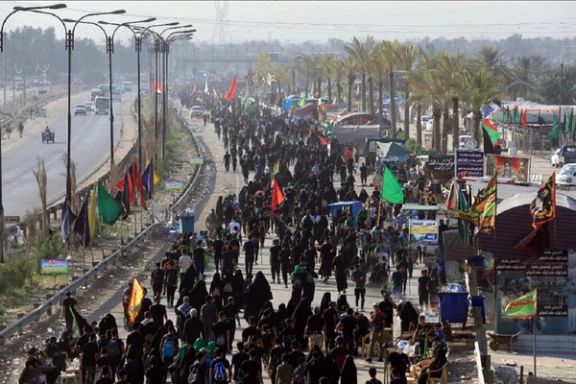
The battle and Hussain’s death is the main pillar of Shiite beliefs. The minority sect in the Muslim world believes that Hussain was the rightful successor to the first four Muslim rulers, being Prophet Muhammad’s grandson and the son of the fourth caliph Ali.
Iranian officials said Friday that conditions in Iraq were simply not ready for accepting a flood of hundreds of thousands of people that could well turn into millions of pilgrims not only from Iran but also Pakistan and Afghanistan.
However, the Arbaeen March to Iraq’s Karbala is a new phenomenon pushed by the Islamic Republic to show the power of Shiites who are a minority in the Muslim world and in West Asia.
Just a decade ago Arbaeen was marked in Iran’s religious centers and there was no tradition of a march to Karbala, but the government with its army of religious institutions and networks began to cultivate concept and with financial appropriations turned it into a millions-strong annual gathering.
This year, the government is offering $100 to each pilgrim, plus a loan of $160 to facilitate the march. In addition to that, transportation, food, medical services, free Wi-Fi and other services are offered. In all, it is estimated that Iran will spend at least $500 million this year despite its dire economic circumstances.
Iraq also experienced political upheaval in August between Iran-backed Shiite groups and followers of Muqtada Sadr, an influential Shia cleric opposed to Iran’s influence in the country.
In 2019, The New York Times quoted an influencial Iranian media boss, Hossein Sulaimani, as saying, “Arbaeen is a display of power for Iran and a showcase of unity among Shiites in the region."

Officials and lawmakers are warning that Iran may be forced to hire foreign doctors as Iranian physicians are emigrating to other countries in droves.
Dr Mohammad Raeeszadeh, head of Medical Council of the Islamic Republic of Iran, recently warned in a speech at a national gathering on the occasion of Physicians’ Day that wrong government policies is causing disillusionment among young medical practitioners and could lead to a wave of emigration or change of career among them.
Warning about the emigration of medical staff, Dr Ali Javaherforoushzadeh, head of the Medical Council of Ahvaz, capital of the southwestern Khuzestan province, recently told the Iranian Students News Agency (ISNA) that in the past year around 300 good standing certificates, which are required for job applications abroad, had been issued for doctors and nurses in the province.
Experts and social scientists in Iran and abroad have told the media that the brain drain in the past few decades, beginning with the 1980-88 war with Iraq, has been accelerated by lack of social freedoms in the clerical-dominated system, political upheavals, deterioration of the economy, and government repression.
Dr Raeeszadeh said many among doctors have no motivation to study further and specialize in fields such as surgery, which are crucial to the country’s healthcare system.
“We will have to dispatch patients abroad for treatment or hire foreign doctors as we did [before the Islamic Revolution more than 40 years ago] if this trend continues,” he said.
Dr Raeeszadeh said that interest in heart surgery has hugely dropped and in the current academic year only two pediatric surgeons graduated in the whole country.
Elaborating on the same subject, Mohammad-Ali Mohseni-Bandpey, a member of the parliament health committee said wrong government policies affecting doctors included ignoring their needs and demands and refusing to allow them to raise their fees despite higher costs of living and running their practices.
For instance, Mohseni-Bandpey explained, the government has allowed private medical practitioners to increase their fees by between 6 to 10 percent but renting a practice is now costing 70 or 80 percent more, the price of equipment has doubled, as have energy costs and the salaries they are paying to the staff at their practices which is up to 60 percent higher than 3 years ago. “They have also set a ceiling [for the fees] in the public sector and the fees that doctors receive are not proportionate to the services they offer.”
According to Mohseni-Bandpey, despite an almost 50 percent annual inflation rate, the government is trying to prevent an similar increase in doctors’ fees, to keep healthcare costs down. He suggested that the government should them to increase their fees but shift the burden to insurance companies rather than patients.
Mohseni-Bandpey told Rouydad 24 news website that Oman, Qatar, and other neighboring countries are attracting not only Iranian doctors but also engineers and those working in the field of humanities.
“These countries use the workforce trained and educated by another country with the least cost,” he said, adding that Hong Kong is currently accepting Iranian students in medical universities and providing them with all their living and educational needs.
“They believe that it would be enough for them if only 10 percent of these students remain in their country, but they don't know that many more will stay and usually not more than 10 percent will come back [to Iran],” he said.

A Republican-sponsored resolution to force the Biden administration to provide Congress with the still-pending draft text of the nuclear deal with Iran is set for a vote next week.
The resolution, introduced by Virginia Foxx (R-NC) and Joe Wilson (R-SC), is scheduled for a vote in the House Foreign Affairs Committee, Jewish Insider reported on Thursday.
The bill would compel the administration to provide Congress with the text of the draft deal and any related side agreements immediately, even if negotiations are still in progress when the bill is passed. Under existing law -- the Iran Nuclear Agreement Review Act (INARA) -- the administration is required to submit any nuclear agreement with the Islamic Republic in full to Congress when it is signed.
A source familiar with the legislation characterized it as an “opening salvo” in efforts to “force” the administration to comply with the existing law, raising concerns that the administration will seek to duck INARA review or conceal side agreements related to the deal, something that Republicans accuse the Obama administration of doing in 2016.
Sen. Bob Menendez (D-NJ), who chairs the Senate Foreign Relations Committee, said during his visit to Israel earlier this week that the administration has committed that it will submit any final deal for congressional review.
Earlier in the month, a bipartisan group of 50 US lawmakers -- 34 Democrats and 16 Republicans -- sounded the alarm on a looming agreement over Iran’s nuclear deal, urging the administration to immediately consult with Congress.
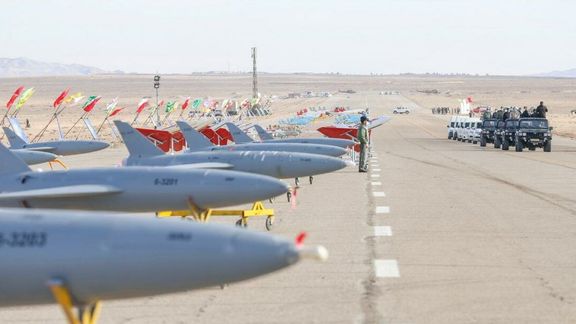
The United States Thursday imposed sanctions on an Iranian company for coordinating transport of Iranian drones to Russia as well as 3 companies involved in their production.
The United States accuses Iran of supplying drones to Russia for use in its war in Ukraine.
The US Treasury Department in a statement said it designated Tehran-based Safiran Airport Services, accusing it of coordinating Russian military flights between Iran and Russia, including those associated with transporting drones, personnel and related equipment.
The Treasury also designated Paravar Pars Company, Design and Manufacturing of Aircraft Engines and Baharestan Kish Company, accusing them of being involved in the research, development, production and procurement of Iranian drones.
The Treasury singled out Paravar Pars Company for involvement in the reverse engineering of US and Israeli-made drones, without specifying which models.
Reuters has reported that some of Iran's drones are based on unmanned aircraft from other countries, including an aerial US RQ-170 Sentinel reconnaissance drone captured in 2011. Also designated was Baharestan Kish Company’s managing director and a member of its board of directors, Rahmatollah Heidari.
Russia most likely planned to acquire hundreds of Mohajer-6 and Shahed-series unmanned aerial vehicles (UAVs), a US official had said.
On Thursday, undersecretary of the Treasury for terrorism and financial intelligence, Brian Nelson, said in a statement, "The United States is committed to strictly enforcing our sanctions against both Russia and Iran and holding accountable Iran and those supporting Russia’s war of aggression against Ukraine."
Thursday's sanctions come as indirect talks between Iran and the United States have made only stuttering progress towards reviving a 2015 deal.
Reporting by Reuters
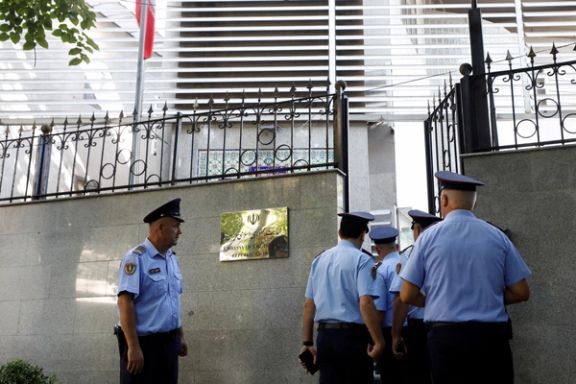
NATO allies condemned Thursday a recent cyberattack against Albania that led to Tirana severing relations with the Islamic Republic a day earlier.
"We strongly condemn such malicious cyber activities designed to destabilize and harm the security of an ally, and disrupt the daily lives of citizens," the North Atlantic Council, grouping the representatives of NATO's 30 member states, said in a statement.
"NATO and allies support Albania in strengthening its cyber defense capabilities to withstand and repel such malicious cyber activities in the future," it added.
Albania cut diplomatic relations with Iran on Wednesday, after Prime Minister Edi Rama accused the Islamic Republic of being behind the July attack and gave its diplomats 24 hours to close the embassy and leave the country. "This extreme response ... is fully proportionate to the gravity and risk of the cyberattack that threatened to paralyze public services, erase digital systems and hack into state records, steal government intranet electronic communication and stir chaos and insecurity in the country," he said.
The United States and the UK strongly condemned the cyberattack, with the US saying it will “take further action to hold Iran accountable for actions that threaten the security of a US ally and set a troubling precedent for cyberspace.”
The attack happened around the time of a conference of the exiled Iranian Albania-based opposition group Mujahideen-e Khalq (MEK). In early August, cybersecurity firm Mandiant expressed “moderate confidence” the attackers were acting in support of Tehran’s efforts to disrupt the MEK conference, which had to be cancelled as well due to a terror threat.
Iran’s foreign ministry Thursday rejected US and UK accusationsabout the alleged cyberattack. Relations between Tehran and Tirana have been tense since 2014, when Albania accepted some 3,000 members of the MEK.